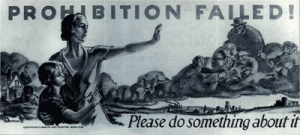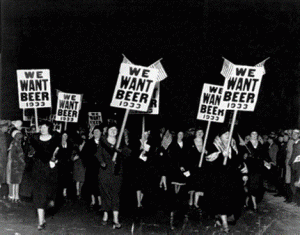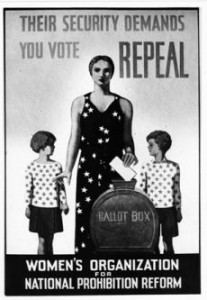One group that pushed for prohibition alongside the Anti-Saloon League was the Women’s Christian Temperance Union (WCTU). The members of WCTU believed that prohibition would prevent violence and the abuse of alcohol in American families. WCTU was a driving force for prohibition until the Anti-Saloon League took the lead. It was not until the late 1920s that a similar women’s organization formed to ironically vote for prohibition repeal.
On May 28, 1929, Pauline Sabin started the Women’s Organization for National Prohibition Reform (WONPR). Sabin and the members of WONPR believed that the Eighteenth Amendment had increased the amount of violence and alcohol abuse among American families. Bootlegging, smuggling and organized crime had become a dramatic issue for the United States. Sabin also stated that the children were growing up “with a total lack of respect for the Constitution and the law.” The campaign for repeal did not take long.
WONPR’s first objective was to become larger than WCTU. At state fairs WONPR would set up informational booths right across from WCTU’s. WONPR also organized two campaigns in Evanston, Illinois where WCTU was founded; one in 1932 and in 1933. By doings so, WONPR gained 1,500 more women. It did not take long for WONPR to become politically stronger than WCTU and the Anti-Saloon League. Pauline Sabin also organized WONPR in such a way that members did not have to pay membership fees; unlike WCTU. This was a great strategy with regards to the Great Depression harming American’s financial stability. Additionally, WONPR gained more members by being gender neutral and allowing men to join its cause.
WONPR argued that prohibitionists tied in too much religious gossip when it came to the alcohol issue. This violated the separation of church and state and WONPR felt that it was every citizen’s own personal choice to drink or not. Martha Byrne, a member of the WONPR’s New York branch, also argued that prohibition and the loss of alcohol sales had harmed the economy too much. She stressed that the money spent on prohibition enforcement should have been used for unemployed Americans. Economic standpoints seemed to be the driving factor for the repeal of the Eighteenth Amendment. On December 5, 1933 the Twenty-first Amendment was ratified ending prohibition and the Anti-Saloon League lost its political power.




There are no comments yet...Kick things off by filling out the form below.